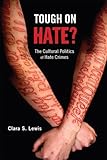Tough on Hate? : The Cultural Politics of Hate Crimes / Clara S. Lewis.
Material type: TextSeries: Critical Issues in Crime and SocietyPublisher: New Brunswick, NJ : Rutgers University Press, [2013]Copyright date: ©2013Description: 1 online resource (192 p.) : 2 photographs, 3 graphsContent type:
TextSeries: Critical Issues in Crime and SocietyPublisher: New Brunswick, NJ : Rutgers University Press, [2013]Copyright date: ©2013Description: 1 online resource (192 p.) : 2 photographs, 3 graphsContent type: - 9780813562315
- 9780813562322
- 364.150973 23
- KF9345 .L49 2014
- KF9345 .L495 2014eb
- online - DeGruyter
- Issued also in print.
| Item type | Current library | Call number | URL | Status | Notes | Barcode | |
|---|---|---|---|---|---|---|---|
 eBook
eBook
|
Biblioteca "Angelicum" Pont. Univ. S.Tommaso d'Aquino Nuvola online | online - DeGruyter (Browse shelf(Opens below)) | Online access | Not for loan (Accesso limitato) | Accesso per gli utenti autorizzati / Access for authorized users | (dgr)9780813562322 |
Frontmatter -- Contents -- Acknowledgments -- 1. Introduction: The Cultural Politics of Hate Crimes -- 2. The Invention of Hate Crimes -- 3. The Nation and Post-Difference Politics -- 4. Cultural Criminalization and the Figure of the Hater -- 5. Hate Crime Victimhood and Post-Difference Citizenship -- 6. Epilogue: Challenging Hate Crimes on a Cultural Front -- Appendix: Methods and Sources -- Notes -- Index -- About the Author
restricted access online access with authorization star
http://purl.org/coar/access_right/c_16ec
Why do we know every gory crime scene detail about such victims as Matthew Shepard and James Byrd Jr. and yet almost nothing about the vast majority of other hate crime victims? Now that federal anti-hate-crimes laws have been passed, why has the number of these crimes not declined significantly? To answer such questions, Clara S. Lewis challenges us to reconsider our understanding of hate crimes. In doing so, she raises startling issues about the trajectory of civil and minority rights. Tough on Hate is the first book to examine the cultural politics of hate crimes both within and beyond the law. Drawing on a wide range of sources-including personal interviews, unarchived documents, television news broadcasts, legislative debates, and presidential speeches-the book calls attention to a disturbing irony: the sympathetic attention paid to certain shocking hate crime murders further legitimizes an already pervasive unwillingness to act on the urgent civil rights issues of our time. Worse still, it reveals the widespread acceptance of ideas about difference, tolerance, and crime that work against future progress on behalf of historically marginalized communities.
Issued also in print.
Mode of access: Internet via World Wide Web.
In English.
Description based on online resource; title from PDF title page (publisher's Web site, viewed 30. Aug 2021)


